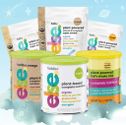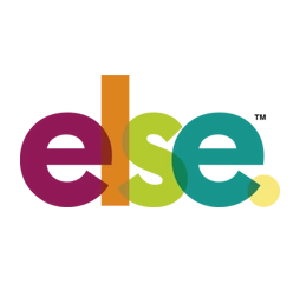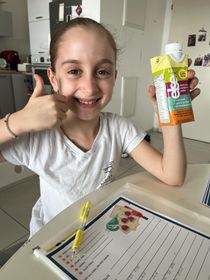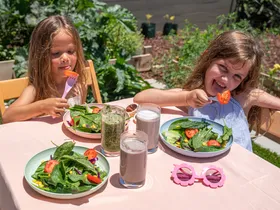How A New Protein Source Is Shaking Up The Baby Formula World
Updated October 11, 2024

Meeting the Rising Demand for New, Alternatives for Baby and Toddler Formulas
Toddlerhood comes with many exciting, and important, developmental milestones, so finding the right nutrition to support this growth is key. Once your toddler is ready to transition off breast milk or infant formula, it can be confusing to know where to turn. When it comes to toddler formulas, for decades the market has been limited to dairy or soy-based options. Unfortunately, these two options do not work for all children - children from families who are vegan or seeking plant-based nutrition, children from families opting for more sustainable, environmental consciousness, soy-free options, or the children who are intolerant of both milk and soy (and believe me, there are plenty) who are not looking to use an expensive, highly specialized medical formula. And these children are in need of a new alternative.
What Are the Options for Toddler Formula and Nutrition?
Starting at one year, toddlers can transition to cow’s milk, a cow’s milk alternative (like a nut, pea, or oat-based milk that you’d find in the milk aisle), or a toddler formula/milk. Compared to milk, toddler formulas provide an extra nutritional cushion for those growing years. They supplement a toddler’s diet with key vitamins and minerals - especially iron and B12, among others, which are not all found in cow’s milk. And, compared to cow’s milk alternatives (i.e. dairy-free milks), toddler formulas offer more calories, protein, fat and a full panel of vitamins and minerals, like iron, calcium, B12, DHA among others. It can be an especially beneficial supplement to children who are underweight, have selective eating, or who are on restrictive diets, such as vegetarian or vegan diets.
Why Plant-Based Toddler Nutrition?
Plant-based diets are on the rise. Why? Some families opt for a plant-based lifestyle for ethical, environmental and sustainability concerns. Others choose this route for suspected health benefits. Plant-based diets are known to be higher in fiber, heart-healthy fats, anti-inflammatory antioxidants, and phytonutrients, which have been linked to reducing the risk of heart disease, diabetes and certain cancers(2) And, going plant-based lowers the exposure to dairy derived from animals that have been treated with antibiotics or hormones. While there has been no direct negative consequence found as a result of milk derived from animals treated with antibiotics or hormone use, there is not a lot of research on its safety either, and there are parents who want to minimize the potential exposure to their little ones during their years of development.
Some skepticism exists around plant-based diets for children because nutritional deficiencies, particularly early in life, may have consequences on growth and cognitive development. But the experts, including the Academy of Nutrition and Dietetics (AND) and the American Academy of Pediatrics (AAP), believe a well-planned plant-based diet can support adequate nutrition in growing children.
Because plant-based diets can be restrictive, children on vegan and vegetarian diets should be closely monitored to ensure the essential nutrients are being met to support proper growth. This is why many toddlers on plant-based diets can benefit from a nutrient-dense toddler formula/nutritional drink that supplements their food intake with a balanced source of added fat, protein, and key micronutrients, especially calcium, vitamin D, iron, B12 and omega 3’s, all from one source.
Seeking Toddler Formula and Nutrition Alternatives
There are many children who cannot tolerate cow’s milk or cow’s milk-based formulas. About 2.5% of children under 3 have a documented cow’s milk protein allergy (CMPA), plus there are many additional children who do not have a documented allergy, but are intolerant resulting in various GI upset, constipation or various behavioral manifestations. A soy-based alternative is not always the solution since many of these children cannot tolerate soy as well, Plus, many families opt to avoid soy because of the inconsistent research on its potential health effects, and its environmental effects as a commonly genetically modified (GMO) crop.
This leaves parents seeking a dairy and soy-free beverage for their toddler with the option to skip the toddler formulas and choose nut, oat, seed or pea milks - but, unfortunately, most of what’s available on the milk aisles are nutritionally inadequate in total nutrition to meet the high demands of toddler growth. This is especially worrisome for children who are underweight, or on a more restrictive plant-based or vegan diet, who require those extra nutrients from milk or formula. And, for parents of children with an intolerance to dairy or soy, the options are to choose a dairy milk alternative or a highly specialized, elemental (i.e. broken down), hypoallergenic medical formulas, which are costly and not very palatable.
So, where are parents to turn?
Parents/Caregivers Are Seeking Formula Alternatives
Parents and caregivers are speaking for themselves. In fact, out of the 1,858 U.S.-based respondents Else Nutrition surveyed using an independent third-party research provider, close to 40% of those who use formula use either a sensitive milk-based formula, soy formula or medical-based formula. In other words, close to half of the children on formula were not on standard, milk-based formulations.
Else Nutrition offers a solution for parents seeking a plant-based, non-GMO, soy-free, animal and dairy-free, environmentally-conscious formula alternative that provides growing toddlers with the essential nutrients to foster growth.
How Else Toddler Nutrition Can Help
There are 3 main ingredients in Else toddler nutritional drink: almonds, buckwheat and tapioca. Together, the almond paste and buckwheat provide fat, but also complement each other to provide all of the essential (meaning the ones the body cannot make) amino acids to be a complete protein. The tapioca provides a quick-acting carbohydrate to fuel the growing toddlers. In fact, 92% of the formula is made of just these 3 pronounceable ingredients, which are used in their whole forms, and not chemically extracted. Now that’s a short, transparent ingredient list, helping parents feel good about knowing exactly what is in the formula.
Don’t let the allergy risk get in your way. Almonds are an allergen in the US, but almond allergies are actually way less common than milk allergies, which is the most prevalent food allergy in children. Almond allergy is reported in less than 1% of all children under the age of 2 years; and, when looking at just children with food allergies, only 9% of them have almond allergies compared to 25% of them who have milk protein allergy. While the name is similar, buckwheat and wheat are different grains altogether. Buckwheat is 100% naturally gluten-free and is considered a very low allergy risk in the US.
How Else Compares to Current Toddler Formulas/Nutrition Drinks
The ingredients in Else plant-based nutrition drink are 92% based on whole plant ingredients and are non-GMO. And, because Else toddler nutrition drink is plant-based, it has the anti-inflammatory benefits, and there is no risk of any derivatives from the use of animal antibiotics or hormones. While many health organizations including the FDA approves the safety of GMOs and milk derived from cows treated with antibiotics and hormones, long term, quality studies on their safety are missing, leaving a lack of strong medical consensus and confidence with their use.
And, if we’re getting very specific here, one potential challenge to plant-based nutrition drinks is the high levels of naturally occurring phytates, a compound that blocks iron absorption. Else plant-based toddler nutrition drink solves that problem by removing the almond skins to reduce the amounts of phytates present in the formula.
Compared to cow’s milk toddler formulas, Else toddler product has less added sugar. Else toddler formula alternative also provides toddlers, especially those with limited or restrictive diets (vegetarians, vegans, selective or picky eaters) a source of iron, B12, which is not found in whole cow’s milk, or readily found in many plant-based foods. For children on a completely dairy-free diet, Else toddler nutrition drink offers a source of needed calcium and Vitamin D for their growing bones. As for dairy-free milk in the milk alternative aisles, they typically fall short of these nutrients.
Where to Go From Here?
As with most things in life, there is no single size that fits all. So why not apply this to formula? There are millions of children, but to date, there have only been 2 main sources of protein used in toddler formulas. While I do not believe a single formula to be generally superior to all others, I do know for certain that different children have different needs. And, Else toddler nutrition drink can help support these needs.
The content and advice provided in this article is for informational purposes only and is not a substitute for medical diagnosis, treatment, advice for specific medical conditions. Always consult a pediatrician to understand the individual needs of your child.











